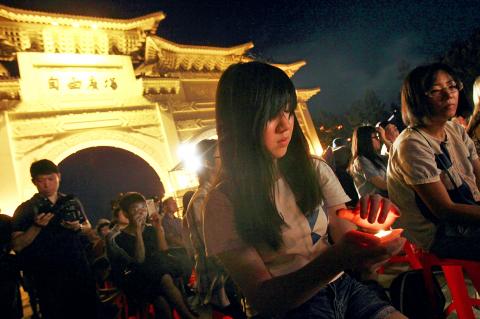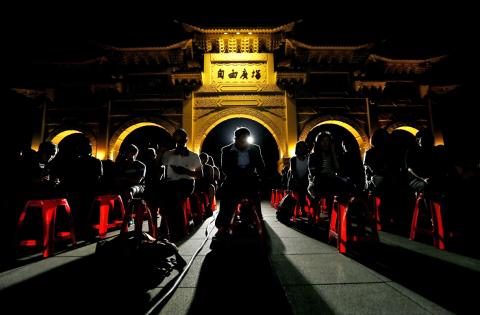Several hundred activists last night gathered in Taipei’s Liberty Square for an event commemorating the 1989 Tiananmen Square Massacre in Beijing, condemning continued human rights abuses by the Chinese government.
Organized by the Student Workshop for Promoting China’s Democracy, the New School for Democracy, the Friends of Liu Xiabo (劉曉波) and the National Taiwan University Student Council, and with the support of a handful of local human rights groups, the event’s site was symbolic, as it was the location of important student demonstrations during Taiwan’s democratization, including an overnight rally on June 3, 1989, in support of the protesters in Tiananmen Square in Beijing.
Lights were dimmed and several moments of silence were observed for the massacre victims, with last night’s event marked by songs interspersed with speeches by several prominent overseas activists, along with Taiwanese human rights figures, who at one point took to the stage holding photographs of political prisoners.

Photo: Chiang Ying-ying, AP
“The spirit of Tiananmen is extremely important to us Tibetans, because we also have been oppressed,” said Lukar Jam, an activist with the Gu-Chu-Sum Movement of Tibet who flew in from India for the event. “The struggle against authoritarianism cuts across nationality and citizenship.”
Wuer Kaixi, an ethnic Uyghur political dissident who participated in the 1989 Tiananmen protests, said President Tsai Ing-wen’s (蔡英文) statement yesterday about the massacre was “disappointing,” because it used “incident,” not “massacre” to refer to the event.
He said “incident” echoed official Chinese government terminology downplaying Tiananmen’s severity, adding that Tsai saying that she did not desire to “point fingers” at China’s political system was also disappointing.

Photo: RITCHIE B. TONGO, EPA
“We have never felt that China’s democratization was the responsibility of Taiwan and Hong Kong, but China’s democratization would absolutely serve as a guarantee of Taiwan’s and Hong Kong’s democracy, so pushing forward China’s democracy is a project we can work on together,” Wuer Kaixi said.
“The issue of Tiananmen should not be something that separates people who identify as Taiwanese or Chinese,” he said, adding that the absence of Chinese students from yesterday’s event might be the result of a message by the event’s organizers.
Event coordinator Chou Ching-chang (周慶昌), a member of the Student Workshop for Promoting China’s Democracy, said that “three to five” Chinese students had volunteered behind the scenes, attributing the low participation to the event’s sensitivity, while other activists said Chinese students organized another event at Shih Chien University in Taipei.
While the annual Tiananmen memorial event was originally hosted by the Bound with Blood Friends of the Mainland Democratic Movement, which emphasizes common “Chinese” ethnicity, in recent years the event’s focus has shifted to emphasizing universal human rights concerns with a broad “pan-green” participation.
“While back in the day you could make appeals to patriotism, Chinese nationalism does not have the same attraction anymore,” Taiwan Human Rights Association secretary-general Chiu E-ling (邱伊翎) said.
Representatives from the Democratic Progressive Party were notably absent from the event, which featured speakers from the Chinese Nationalist Party (KMT), the Green Party Taiwan, the Social Democratic Party and the New Power Party, with Chou attributing their absence to the short notice given by the organizers, whom he said invited political representatives only last week because of “rushed” preparations.
Activists said that the event’s planning was thrown into disarray by the withdrawal of the Taiwan Association for China Human Rights, which had previously provided half of the event’s funding.

Tropical Storm Gaemi strengthened into a typhoon at 2pm yesterday, and could make landfall in Yilan County tomorrow, the Central Weather Administration (CWA) said yesterday. The agency was scheduled to issue a sea warning at 11:30pm yesterday, and could issue a land warning later today. Gaemi was moving north-northwest at 4kph, carrying maximum sustained winds near its center of up to 118.8kph and gusts of 154.8kph. The circumference is forecast to reach eastern Taiwan tomorrow morning, with the center making landfall in Yilan County later that night before departing from the north coast, CWA weather forecaster Kuan Shin-ping (官欣平) said yesterday. Uncertainty remains and

SEA WARNING LIKELY: The storm, named Gaemi, could become a moderate typhoon on Wednesday or Thursday, with the Taipei City Government preparing for flooding A tropical depression east of the Philippines developed into a tropical storm named Gaemi at 2pm yesterday, and was moving toward eastern Taiwan, the Central Weather Administration (CWA) said. Gaemi could begin to affect Taiwan proper on Tuesday, lasting until Friday, and could develop into a moderate typhoon on Wednesday or Thursday, it said. A sea warning for Gaemi could be issued as early as Tuesday morning, it added. Gaemi, the third tropical storm in the Pacific Ocean this typhoon season, is projected to begin moving northwest today, and be closest to Taiwan on Wednesday or Thursday, the agency said. Today, there would likely

DISRUPTIONS: The high-speed rail is to operate as normal, while several airlines either canceled flights or announced early departures or late arrivals Schools and offices in 15 cities and counties are to be closed today due to Typhoon Gaemi, local governments announced last night. The 15 are: Taipei, New Taipei City, Taoyuan, Tainan, Keelung, Hsinchu and Kaohsiung, as well as Yilan, Hualien, Hsinchu, Miaoli, Chiayi, Pingtung, Penghu and Lienchiang counties. People should brace for torrential rainfall brought by the storm, with its center forecast to make landfall on the east coast between tonight and tomorrow morning, the Central Weather Administration (CWA) said. The agency issued a sea warning for the typhoon at 11:30pm on Monday, followed by a land warning at 11:30am yesterday. As of

CASUALTY: A 70-year-old woman was killed by a falling tree in Kaohsiung as the premier warned all government agencies to remain on high alert for the next 24 hours Schools and offices nationwide are to be closed for a second day today as Typhoon Gaemi crosses over the nation, bringing torrential rain and whipping winds. Gaemi was forecast to make landfall late last night. From Tuesday night, its outer band brought substantial rainfall and strong winds to the nation. As of 6:15pm last night, the typhoon’s center was 20km southeast of Hualien County, Central Weather Administration (CWA) data showed. It was moving at 19kph and had a radius of 250km. As of 3pm yesterday, one woman had died, while 58 people were injured, the Central Emergency Operation Center said. The 70-year-old